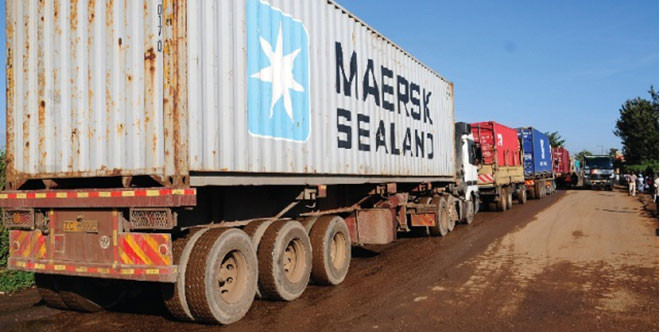SPECIAL REPORT: Uganda recorded a $45m (sh164b) decline in exports to Kenya between March and August 2020 over the COVID-19 pandemic triggered border restrictions and demand shocks, the East African Business Council (EABC) chief executive officer has said.
Speaking during a virtual panel discussion during the launch of the “Waving or Drowning? The Impact of the COVID-19 pandemic on East African Trade” on Wednesday, Peter Mathuki said that the pandemic saw Uganda’s exports to Kenya dive by $45m while Kenya lost about $70m (sh255b) in trade with Tanzania.
The pandemic also caused delays at border points due to delays in getting the COVID-19 test certificates. Mathuki said that the average time for getting a COVID-19 test was 48 hours, which brought about congestion at border points.
The report also noted that cargo transit from Mombasa Port to Malaba on the Uganda-Kenya border increased from seven to 11 days by the second quarter of 2020 while the time taken to transport goods via the Mombasa-Busia route was nearly three times higher.
On the Central Corridor, the transit time from Dar-es-Salaam, Tanzania, to various cities in the neighbouring countries also more than doubled, according to the report.
The report was produced by the United Nations Economic Commission for Africa (UNECA), in partnership with TradeMark East Africa (TMEA) and African Economic Research Consortium (AERC).
Despite the initial declines, however, the report noted that EAC exports have mostly recovered to pre-crisis levels, with most EAC states’ exports surpassing their 2019 levels by the third quarter of the year, following the easing of lockdown restrictions and a broader global trade recovery, which has started to take place.
“Initially, there was fear that the pandemic would lead to a severe collapse of global trade; the World Trade Organisation (WTO) forecast initially buttressed this gloomy picture, suggesting that global merchandise trade volume could plummet by between -13 and -32% in 2020 but that has not been the case.
“EAC economies (Burundi, Kenya, Rwanda, South Sudan, Tanzania, and Uganda) have, by global standards, proven to be relatively resilient,’ Andrew Mold, Chief of Regional Integration and AfCFTA Cluster at UNECA SRO-EA said while presenting the report findings during a virtual report launch on Wednesday.
WTO projections now show a recovery, albeit weak, in the growth of global merchandise trade of 7.2% in 2021 after a 9.2% decline in 2020. The International Monetary Fund and World Bank also forecast growth in merchandise trade of 7% and 8%, respectively.
The research report was informed by the need for a more comprehensive understanding of the impact of the COVID-19 pandemic on trade performance across individual EAC member states and collectively as a block to enable policy makers to formulate evidence-based policies.
Currently, the region lacks an evidence-based, detailed account of the economic and trade impact of the pandemic.
The report advised EAC partner states to double-down on policies to diversify their economies and appealed to governments and other relevant stakeholders to address the challenges facing informal cross-border traders.
The TMEA chief executive officer Frank Matsaert explained that the report provides a good starting point for governments, the private sector and other stakeholders to think about how to respond to the pandemic and its impact on trade, in the medium and longer-term, adding that evidence-based interventions are crucial for robust policymaking and programmatic responses.
“COVID-19 is going to be with us for some time; the roll-out of vaccines will take time. Therefore, the things that we have learnt in our responses that we co-generated will be important for the next year or two. It is important that we take up the lessons and support countries to fully recover better,” Matsaert said.
If you would like your article/opinion to be published on Uganda’s most authoritative news platform, send your submission on: [email protected]. You can also follow DailyExpress on WhatsApp and on Twitter (X) for realtime updates.



